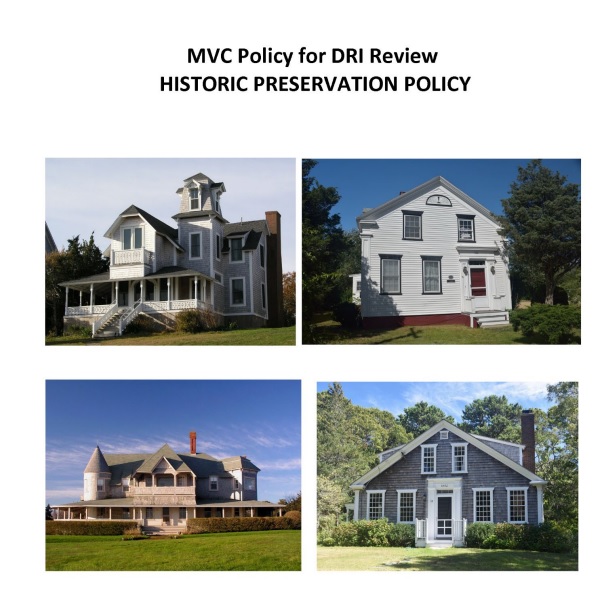DRI Documents
1) The DRI Process - Overview of the review process
2) DRI Checklist (Version 14A) - Effective date: December 1, 2021
3) DRI Checklist Maps (Version 14)
Historic Inventory Dashboard - to aid in identifying buildings that are over 100 years old. Dashboard's How-to Video
4) DRI Referral Form (Version 14)
5) The DRI Application Guidance - Requirements for DRI applications
7) DRI Procedures - Official procedures for DRI review, approved Jan. 2022
DRI Policies
The MVC has adopted policies, which cover a broad range of issues, to help applicants and members of the public understand how the MVC evaluates proposed Developments of Regional Impact. These policies outline the Commission's general goals and objectives for each topic, as well as providing specific criteria and guidance which the Commission believes will further its goals and objectives. The policies reflect MVC practices in reviewing subdivisions and developments over the past generation and are generally a good indication of the Commission's concerns. The polices are intented to assist applicants in designing projects and preparing proposals that address the Commission's concerns.
This policy, adopted in 2006, which applies to all subdivisions as well as developments on parcels greater than 3 acres, calls for setting aside certain portions of most of these properties as permanently protected open space.
This policy gives basic guidance about the layout of the development in relation to the property, as well as about landscaping and lighting. (Also refer to the online Polly Hill Arboretum Plant Selection Guide, a resource intended to guide municipalities, landscape architects, and individuals towards plants with excellent horticultural, ecological and adaptive characteristics that are suitable for landscape uses on Martha’s Vineyard.)
The goals of this policy are to 1) reduce or eliminate the consumption of fossil fuels, and the emission of greenhouse gases, associated with DRIs, 2) maximize the energy efficiency of DRI buildings, parking lots, and other structures, and 3) improve energy resilience.
Housing Policy
This policy applies to all projects that are likely to generate an incremental need for housing affordable to a variety of household incomes, and seeks to ensure that new residential and commercial developments do not further exacerbate the existing housing problem. It lays out the criteria used by the MVC to calculate certain probable effects a development may have on the affordability of housing on the Island.
Historic Preservation Stakeholder Meeting
|
On March 22, the MVC held an informational meeting on the Historic Preservation Policy that is used to evaluate applicable Developments of Regional Impact. The purpose of the meeting was to review the existing policy, the requirements for referral to the MVC, the MVC's primary concerns related to the demolition or alteration of historically significant structures, and to have an open discussion about the effectiveness of the policy. About 15 people attended in person, and more than 30 people participated via zoom. A link to the policy can be found here. Alex Elvin's presentation can be found here. posted 3/22/2023 |


